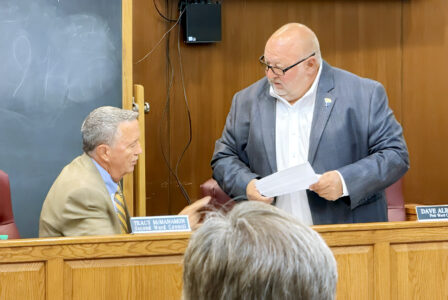EGCC files suit seeking relief
STEUBENVILLE — Eastern Gateway Community College has filed a lawsuit to prevent the U.S. Department of Education from enforcing cease-and-desist and other orders dismantling its free college program.
The suit, filed Friday in U.S. District Court for the Southern District of Ohio, “hopes to bring clarification for more than 31,000 students awaiting answers regarding future semesters at EGCC, with the spring 2023 semester opening enrollment in October,” college officials said in a late afternoon news release.
“While we have tried to engage with the agency on its allegations and directive to cease offering the Free College Benefit Program, they have not responded to our questions, have not commented on our proposed modifications, have not released the program review on which their enforcement actions are based and have not permitted us to take advantage of the administrative appeals process,” said Michael Geoghegan, president of the school which has its main campus in Steubenville and another campus in Youngstown.
“In order to preserve access to education for our students, we had to take this legal action. We are optimistic that the court will agree that there is a better and more equitable way to address the concerns expressed by ED officials and help us maintain access to higher education for our students.”
DOE Midwest Division Chief Jeremy Early had issued a “cease-and-desist” notice July 18, ordering EGCC to pause its free college benefit program “and not disburse Pell grant funds to any new students enrolling in (it) until the program is redesigned.” The department followed that letter up in August by designating the college as Heightened Cash Management Level 2 status for Pell Grants, which means the college will have to make disbursements to students from its own institutional funds, then submit a reimbursement payment request to DOE, and also demanded the college prepare a teach-out agreement for those students.
The 26-page complaint seeks an injunction blocking enforcement of the orders as well as damages.
“Despite immediate, repeated and urgent requests for clarity as to how the program might be redesigned or what specific standards must be met for EGCC to continue to serve its students, DOE has refused EGCC any opportunity to be heard,” the college alleges in its suit, claiming that DOE had “deprived EGCC of its due process rights and exceeded its statutory authority by issuing a cease-and-desist letter that has the immediate impact of significantly limiting (the college’s) participation in federal financial aid, without notice or opportunity for hearing.”
“Perhaps the most striking fact of the DOE’s overreach is that every allegation lodged in the cease-and-desist letter and subsequent enforcement actions is apparently based on a program review determination letter that EGCC has yet to receive,” the suit charged.
It says that, absent relief, “EGCC and its students will be immediately, continuously and irreparably harmed” by DOE’s actions.
In its news release, EGCC alluded to how disruptive it has been to students “planning their degree programs, whose average age is 34 years old, who are working full time and raising families while pursuing a degree.”
It also pointed to the hundreds of employees working at the college, and said administrators are “committed to opening a two-way relationship with federal and state agencies to resolve any outstanding issues to provide continuity and clarity for students.”
“Our students are often first-generation college students, trying to better their lives by earning an associate degree,” Geoghegan said. “They are going to school to be nurses, social workers, paralegals and accountants to better our communities. They deserve clear communication, and we will continue to advocate for their futures. We seek to provide answers that will allow our students to focus on their studies.”



